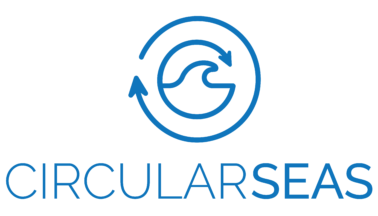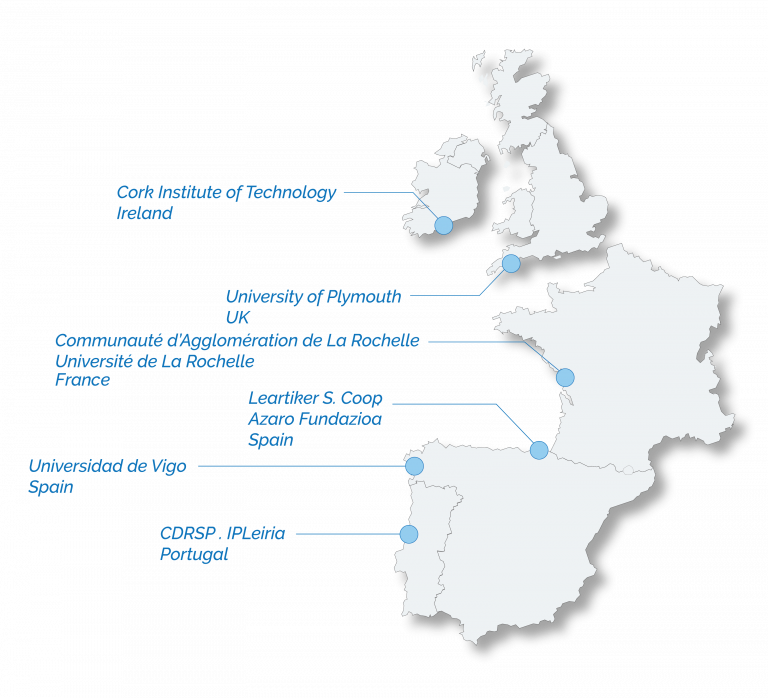
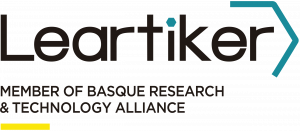
LEARTIKER - Lead Partner
We are a highly skilled team of internationally recognized researchers devoted to research, technological development and innovation and specialized in Polymer Technology and Food Technology. We belong to the Basque Science and Technology Network (RVCTI).
Located in Markina-Xemein innovation centre in Biscay, we accompany businesses in developing new products, advising and supporting them to find new business opportunities as well as to improve and diversify their products. We have top infrastructures that enable us to guarantee our customers the best service compound with the highest quality in the processes, banking on personalized monitoring of each project.

LEARTIBAI FUNDAZIOA
Leartibai Fundazioa is an organisation whose goal is to promote the creation of new businesses and improve the competitiveness of business fabric in its immediate surroundings, preferably in the Lea Artibai region.
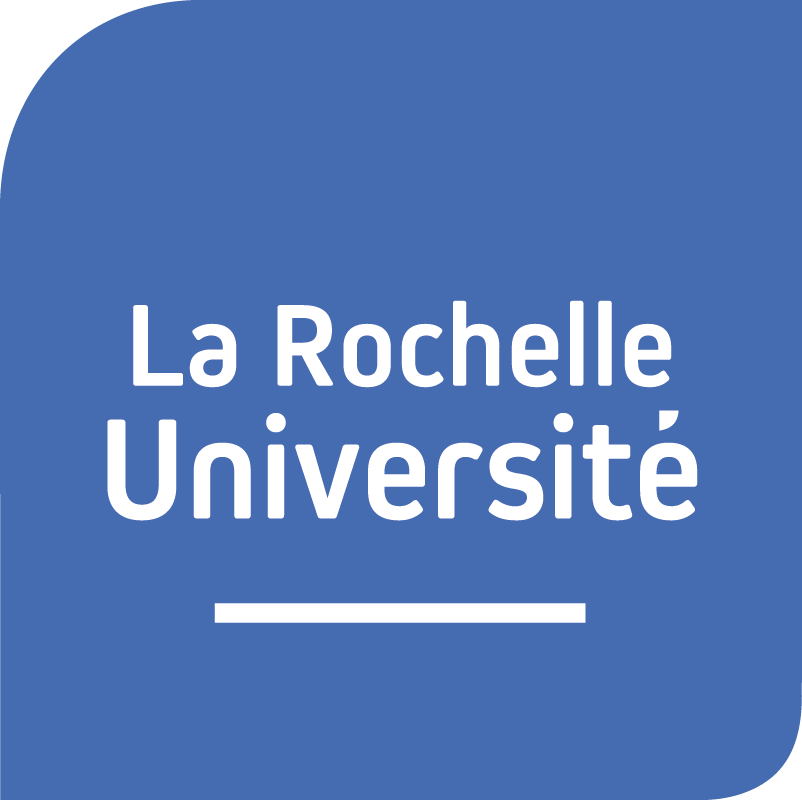
UNIVERSITÉ LA ROCHELLE
The university was founded in 1993, and is the newest university in France. The first stone was laid by François Mitterrand and Helmut Kohl. It strives to stand out by offering innovative courses in business law and the Asian-Pacific world. At the start of the year 2000 there were 6000 students. Alongside these university courses there are other colleges like the hotel school, the law school, the business school, the School of Mass Communications etc.
The university contains at present three schools: languages, arts, and human sciences. It also offers courses and exchanges tied to Asia/Pacific, and the Americas. With 64 international agreements on 5 continents and 30% of the academic studies in foreign languages, the Graduate Schools of Commerce and Mass Communications of La Rochelle offers programs leading to the Masters and Doctor of Arts degree.
Its goal is to become one of the best independent schools in France and in Europe, especially in terms of recognition from companies. It offers online studies in cooperation with the City University Graduate Center CUNY, State University of New York SUNY.

COMMUNAUTÉ d'AGGLOMÉRATION LA ROCHELLE
Située entre Nantes et Bordeaux, sur la côte atlantique française, la Communauté d’Agglomération de La Rochelle (CdA-LR) est un établissement public de coopération intercommunale qui regroupe 28 communes et a pour objet l'élaboration de « projets communs de développement au sein de son périmètre de solidarité ».
A ce titre, la CdA est à la fois un organe politique et administratif, exerçant des compétences obligatoires et optionnelles, en lieu et place de ses 28 communes membres. Ses compétences s'exercent dans différents domaines, répondant aux besoins des citoyens (169 000 habitants), des entreprises (12 655) et autres organismes publics et privés du territoire: développement économique et emploi; enseignement supérieur ; urbanisme ; transport et mobilité ; habitat social ; production et traitement de l'eau ; gestion des déchets ; environnement et qualité de vie ;…
Avec ses 70 km de façade littorale, cette agglomération de taille moyenne est façonnée par l'interaction terre/océan et ses infrastructures et installations portuaires sont reconnues aux niveaux national, européen et international:
- un port de plaisance, le plus grand d'Europe (5 047 places / 70 hectares)
- un port de commerce, 6ème Grand Port Maritime français (trafic total 2018: 9,6 Mt)
- un port de pêche, offrant un bassin de 10 hectares en eau profonde et une véritable plateforme multiservices et logistique d'une superficie de 22 000 m² entièrement équipée pour les professionnels de la mer.
En plus d’abriter une filière nautique dynamique et emblématique, le territoire de la Communauté d’Agglomération comprend également des filières pêche et cultures marines. L'axe environnemental du GALPA (Groupe d'action locale pêche aquaculture) porté par la collectivité intègre, dans ses objectifs, la préservation des écosystèmes marins, la promotion des filières innovantes en réponse aux nouveaux enjeux environnementaux ainsi que le recyclage et la valorisation des déchets issus de la conchyliculture et de la pêche.
En effet, le développement durable est inscrit dans la culture et les valeurs de la Communauté d’Agglomération de La Rochelle, qui en a fait une priorité dès les années 1970 et s'est engagée en 2017 dans un projet de territoire sobre, créatif et solidaire. En septembre 2019, la CdA a été primée au niveau national pour son projet "La Rochelle Territoire Zéro Carbone" (LRTZC). L'un des axes forts de cette démarche ambitieuse, feuille de route du projet local CircularSeas, est l’accompagnement des acteurs économiques dans la transition écologique en déployant des approches d'économie circulaire, se traduisant par une gestion optimale de l’énergie et de la matière.

CDRSP - IPLEIRIA
The mission of the Centre for Rapid and Sustainable Product Development (Centro para o Desenvolvimento Rápido e Sustentado de Produto – CDRSP) of the Polytechnic Institute of Leiria (IPLeiria) is to contribute to scientific and technological development, leading to new products, materials and processes that are more fitted, more effective and more efficient, contributing to a generation of added value to the industry and promoting the conscience of the importance and of the role of the rapid and sustainable product development in the society. In order to accomplish this mission, the CDRSP-IPLeiria leads scientific and technological research and promotes dissemination, training and consultancy actions in strategic areas of product development.
The aim of the strategic research programme is to consolidate and reinforce the national and international position of the CDRSP-IPLeiria as a leading research group in the field of Multiscale Direct Digital Manufacturing based on Additive Manufacturing, moving towards the fully integrated concept of added-value manufacturing. This is possible due to the multidisciplinary nature of the CDRSP Research Team, comprising researchers from different scientific backgrounds. The main Scientific Research Areas of CDRSP-IPLeiria lays on Additive Manufacturing, having a focus on 60% of applied research and 40% of basic research. To do so, the development of Additive Manufacturing is supported by 3 core interconnected scientific pillars: (i) Geometry and topology/Computer simulation (ii) Advanced materials; and (iii) Novel manufacturing processes.
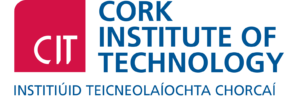
CORK INSTITUTE OF TECHNOLOGY
Cork Institute of Technology opened in 1973, comprising two constituent faculties and three constituent colleges. The constituent faculties are Engineering and Science, and Business and Humanities. The constituent colleges are the CIT Crawford College of Art and Design, the CIT Cork School of Music and the National Maritime College of Ireland, Ringaskiddy.
Research is at the core of CIT activities. Within the institutes faculties and colleges, are a number of specialised research centres namely Nimbus, CAPPA, V-LINC, The Rubicon and Halpin Centres for research and innovation. Nimbus Centre is focussed on embedded systems research and operate as part of the Engineering faculty of the institute. The Rubicon Centre operates as a business incubation centre and is home to 57 knowledge based start-up companies with clients based at the Rubicon at different stages of development, from concept stage to completing their first customer orders and many are already trading on the International Market. The National Maritime College (NMCI) specifically focused on maritime and nautical training is the first third level college built in Ireland under the Government’s Public-Private Partnership (PPP) scheme. In this case, the public partners are the Cork Institute of Technology and the Irish Naval Service and the private partner is Focus Education. The Halpin Centre for Research and Innovation operate from NMCI and are the maritime research branch of CIT. Blackrock Castle Observatory also within CIT are the Astronomy and Physics Instrumentation research group. All research centres and groups of postgraduate and doctorate researchers within CIT have shown through state of the art technology development, innovative business incubation and creation combined with top tier physical and biological science research, to be highly successful in attracting significant project grant funding across various European Commission funded research schemes. This has led to recent successes in the approval for rebranding and reclassification of CIT as a Technological University, which will further elevate and enhance the research capacity of the centres and faculties within. The scope of national and international research conducted at CIT will be further enhanced as it will merge with Institute of Technology Tralee and amalgamate its expertise in research areas like health and social sciences, engineering and computing.
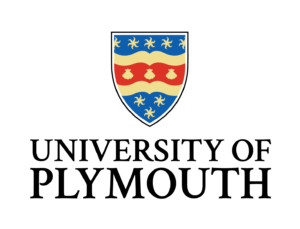
UNIVERSITY OF PLYMOUTH
The University of Plymouth is a public university based predominantly in Plymouth, England where the main campus is located, but the university has campuses and affiliated colleges across South West England. With 19,645 students, it is the 38th largest in the United Kingdom by total number of students (including the Open University). It has 2,915 staff.
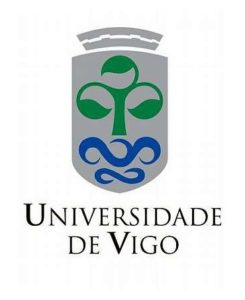
UNIVERSIDAD DE VIGO
The Universidade de Vigo is a young and dynamic institution that offers a wide range of training programs in the three specialized and innovative campuses that make it up.
We are present in the municipalities of Ourense, Pontevedra and Vigo with three specialized campuses where you will find more than 30 centers for training and research, as well as facilities for sports and leisure, with a continuous cultural program. We also have the Campus of International Excellence Campus do Mar lead by the University of Vigo and which adds more than 3000 researchers, forming a cross-border network of research and knowledge with the sea as a driving force.
